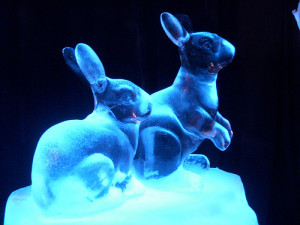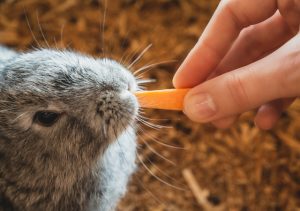
Heat can be deadly to rabbits. They can’t handle heat very well. They have thick fur coats that they can’t simply take off whenever the temperature rises. In fact, heat stroke is one of the alarming things to watch out for during the summer months. Pregnant and nursing rabbits should be given special attention with regard to preventing overheating. As pregnant and nursing bunnies are carrying around more weight on them, the risk of heat stroke is higher among them.
Pet rabbits are more susceptible to heat stroke than humans. Panting along with flaring of the nostrils as the rabbit breathes are signs of heat stress. These signs can lead to heatstroke and eventually death if not treated immediately.
Can I Give My Rabbit an Ice Cube? Yes!
Rabbit certainly love cool things. They snuggle up to them and lick them. Giving them cool things like ice cubes, particularly during summertime, is a good idea. Your bunny will surely enjoy playing with ice cubes. They may even chew on them.
If the temperature gets really high and you notice some signs of heat stress in your rabbit, you can rub an ice cube against your pet’s ears. This is because a rabbit’s heat is regulated through his ears.
Heat stress and exhaustion are less severe than heatstroke. If caught early, heat stress can be treated at home. Heatstroke is the rise in your rabbit’s body temperature accompanied by physical and neurological symptoms. This condition is considered a medical emergency as failure to administer early treatment can lead to death.
It is important to keep your bunny cool and hydrated to prevent heat stroke. Giving him cool things to play with and chew on will go a long way.
Aside from ice cubes you may also put frozen water bottles in your pet’s cage. Your beloved bunny will definitely appreciate if you put some frozen water bottles in his cage twice daily. Wrapping the frozen water bottle in a cloth or towel will help it to stay frozen for a longer period of time.
During summer months you can offer you rabbit some frozen treats. Like frozen water bottles, this is a good way to keep your beloved pet hydrated and cool. There are many variations you can try such as frozen fruit bits or frozen flavored natural juice. However, it is recommended to dilute it as it may have too much sugar. Or you can simply freeze his favorite treat.
Also ensure that your pet stays hydrated. Easy access to water sources should be considered. If your rabbit is drinking from a bowl you can try adding a handful of ice cubes in the water to keep it cool for a longer period of time. Giving your rabbit fresh vegetables will also help to keep him hydrated.
Another simple yet extremely important thing to do is to give your pet ample cover from the sun. Most cases of feat stroke in rabbits is caused by direct sunlight exposure or if the bunny is too close to a heat source such as a radiator.
Providing a small fan to create a cool air flow is likewise a good idea. You can drape a cold wet towel near the rabbit and aim the fan at the towel. This will help cool the air as the water evaporates.
If you have air conditioning you can turn it on for a short time to help alleviate your pet’s warm feelings. Or you may open the windows if nature can seem to provide some breeze.
It would also help if you groom your rabbit regularly. Getting rid of excess fur will definitely aid in cooling your bunny down.
Using ceramic tiles is also a good idea to keep your bunny cool. These tiles remain cool even during hot weather. You can also place the ceramic tile in the freezer for a few minutes for a cooler feel.
For extreme cases wherein your bunny is showing symptoms of heat stroke like panting, lethargy, salivation, weakness and convulsion, be very vigilant and take your pet to the veterinarian as soon as possible.
Remember not to put your rabbit under cold water or into a cold bath if he has symptoms of heat stroke. This would make the problem worse as it could put the rabbit in shock. Instead, dampen the ears with cool (not freezing or very cold) water to help to bring down his body temperature. And more importantly, seek your veterinarian’s help immediately.





